It’s a talent management question business leaders often ask: Should we roll out an LXP first or deploy a talent marketplace first?
When we field that question here at Degreed, we’re quick to dig a bit deeper, asking: What are your goals and challenges?
Yes, the learning experience platform (LXP) and the talent marketplace each are used in the realm of human resources and talent management. And, yes, they serve many of the same end users. But they do so with very different purposes, each with distinct value propositions.
And consider this: The Degreed LXP and a talent marketplace can be paired to great effect—delivering results that, as the old saying goes, exceed the sum of their parts. In today’s dynamic world of work, incorporating a best-in-class LXP like Degreed as well as a talent marketplace into your talent management strategy can help align learning to workforce planning—with speed, at scale, and for impact—so L&D can drive change that prepares employees for anything.
So, where should you start? Let’s take a closer look at how an LXP and talent marketplace each help solve workplace problems —and how they can work together.
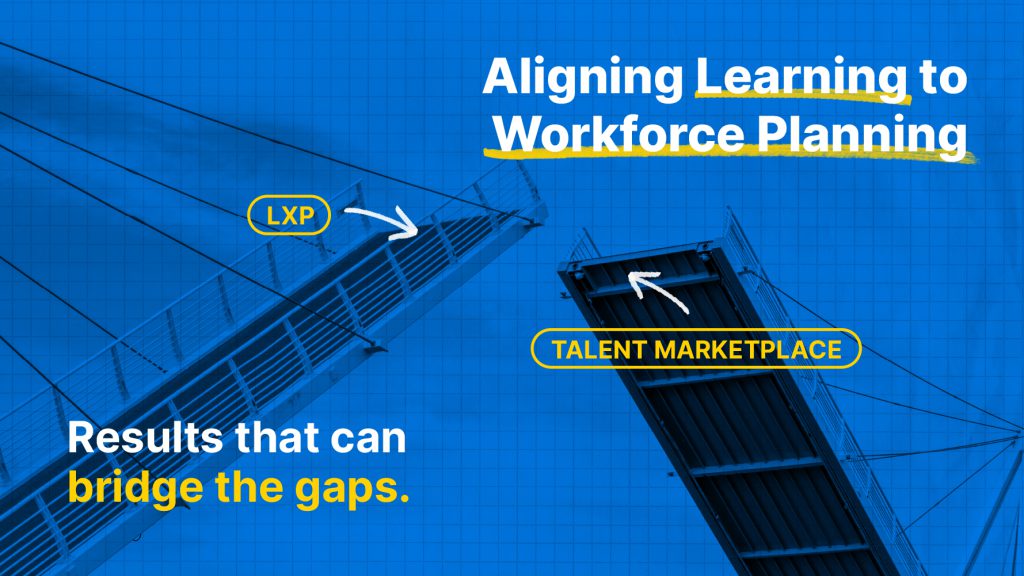
The Talent Marketplace: Connecting Talent to Opportunity
A talent marketplace enables organizations to connect people to new, permanent roles as well as projects, internships, specific tasks, or other opportunities that are often temporary or short-term but sometimes lead to a full-time position.
How? Talent marketplaces help employers and employees match people’s experience, availability, and skills to job and project requirements. They maintain talent profiles and typically feature communication tools that facilitate collaboration.
Teams exploring a talent marketplace are looking to more efficiently and effectively match talent to work, improve career mobility and employee retention, and ensure roles are filled faster so critical work gets done.
A talent marketplace can help you and your organization:
- Fill opportunities effectively and efficiently with the best talent.
- Boost retention by helping your people see they can grow their careers within your company.
- Identify hidden talent across your workforce that might otherwise go unnoticed.
- Conduct succession planning.
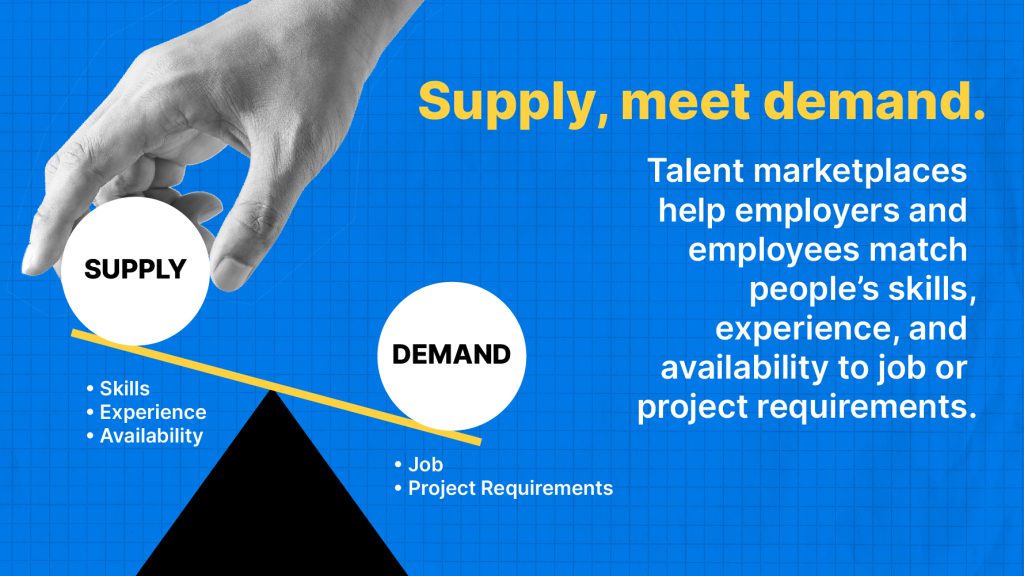
The Talent Marketplace: Value Through Access
The value of a talent marketplace lies in its ability to boost access to a diverse pool of talent. A talent marketplace enables businesses to quickly scale their teams, tap into specialized expertise, and match people to jobs or projects—without the need for traditionally expensive and lengthy external hiring.
Organizations can quickly scale teams up or down as needed, allowing them to shift talent around and adapt to fluctuating workloads, project demands, or specific skill requirements.
Leveraging existing talent through a talent marketplace can often be more cost-effective than hiring. And talent marketplaces can facilitate rapid hiring, enabling organizations to find talent quickly for time-sensitive projects or urgent tasks—including people with niche or specialized skills—improving organizational and project efficiency.
By tapping into talent with diverse backgrounds and perspectives across the business, organizations can foster innovation and creativity, bringing fresh ideas and approaches to projects and initiatives.
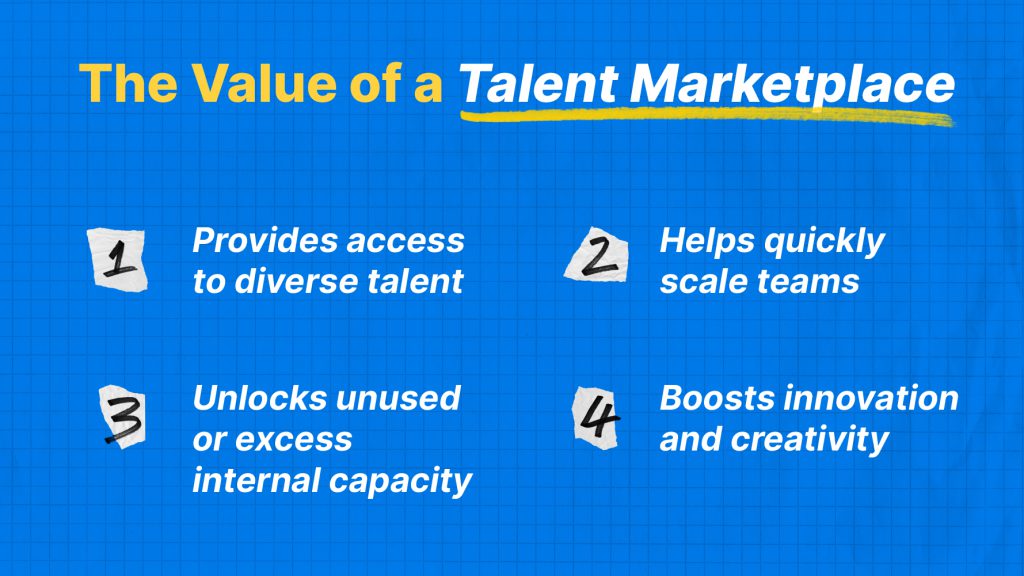
Now, taking all that into consideration, let’s turn our attention to the LXP.
“The talent marketplace system needs learning,” industry analyst Josh Bersin, founder and CEO of the Josh Bersin Company, noted shortly after the platform category exploded into view. That fundamental dynamic hasn’t changed.
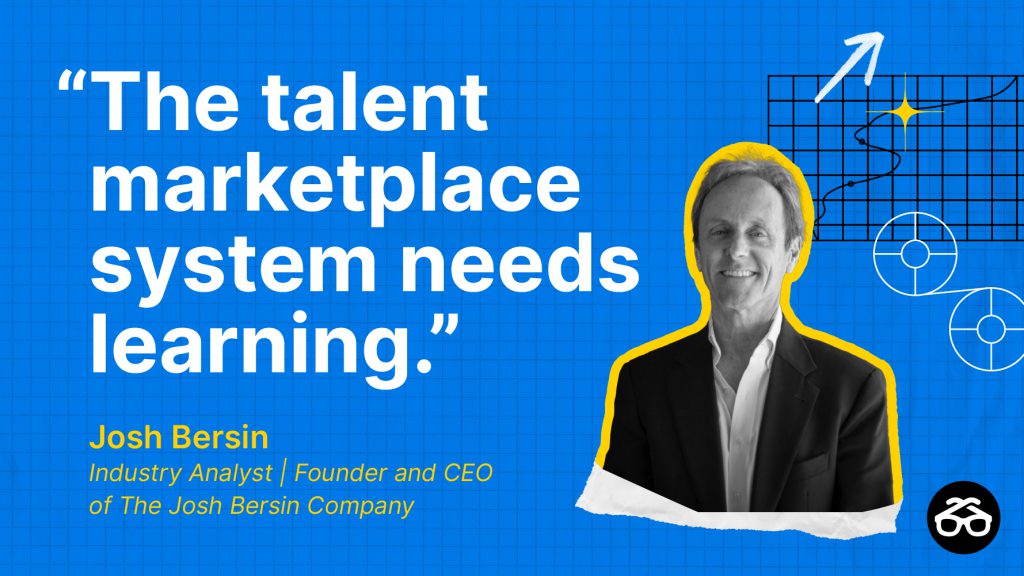
LXPs: From the Commonplace to Degreed
Generally Speaking: The LXP Baseline
A primary focus of any LXP is to provide more personalized learning quickly, at scale, so people can develop and grow. How? By facilitating learning and upskilling on a daily basis.
An LXP is designed to provide employees with a wide range of integrated learning content and modalities, including courses, videos, articles, podcasts, webinars and interactive modules. This flexibility allows employees to choose the format and pace of learning that best suits their learning styles and schedules, and it also makes curating content for employee consumption more efficient.
LXPs often include features that facilitate knowledge sharing, collaboration, and social learning. Employees can share insights, best practices, and expertise with their peers— unlocking the power of institutional knowledge and individual expertise.
By investing in employee development and providing opportunities for growth and advancement, LXPs contribute to higher levels of employee engagement, job satisfaction, and retention. Employees feel valued and motivated when organizations prioritize their professional development, and businesses get the benefit of a workforce ready for anything. However, only 52% of workers are confident that they are growing their careers with their current organization, according to Deloitte, which also found that workers who do not feel like they’re growing at their current employer are two-and-a-half times more likely to quit within a year.
Designed to be adaptable and scalable, LXPs help organizations evolve learning strategies to meet changing business needs, technological advancements, and workforce dynamics effectively.
Advanced Approaches: Data, Insights, Personalization
An advanced LXP helps business and L&D leaders align learning initiatives with organizational goals and priorities, and in doing so it helps leadership drive positive business outcomes such as improved performance, productivity, innovation, efficiency, and competitive advantage.
Advanced LXPs also provide insights—useful data—into employees’ learning progress and performance through robust tracking and analytics capabilities. This information allows organizations to measure the impact of learning and identify and fill skill gaps to optimize learning strategies.
Degreed: Developing Skills that Matter Most
Degreed is designed to drive change so your people can know, learn, and grow the skills that matter. Our LXP is not a thin user interface (UI); it allows you to manage data, personalize development, and show the impact your learning is having on organizational success.
Degreed is for more than just learners. Our LXP is a strategic tool L&D leaders use to connect learning to the business—by pinpointing skill needs and gaps, reducing effort with automations, building learning experiences faster, and measuring change at the skill, individual, and organizational level.
Degreed offers engaging and motivating personalized learning experiences that use artificial intelligence (AI) to curate and recommend relevant content based on each individual user’s interests, preferences, skills, job role, learning history, performance, goals, and engagement.
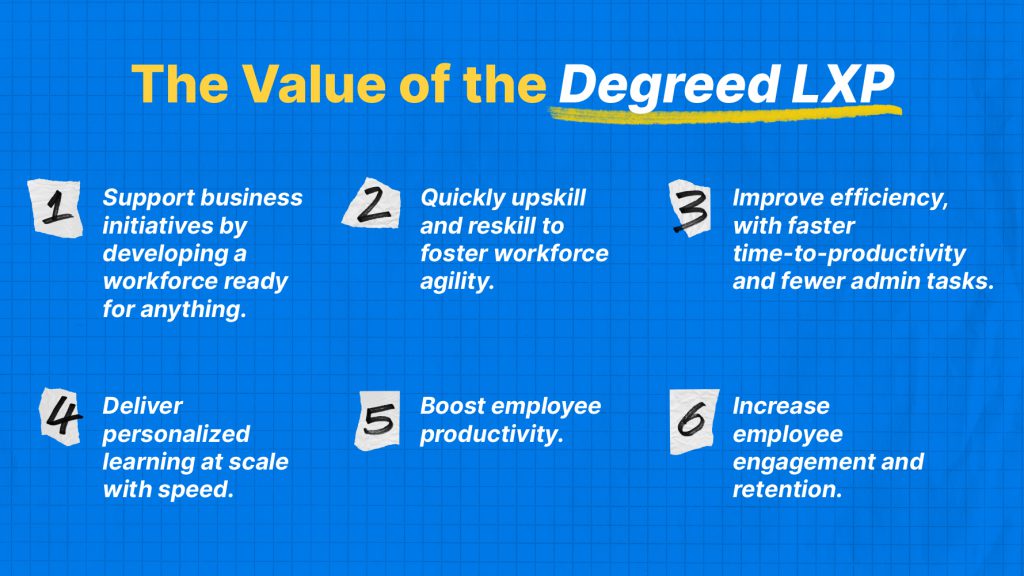
In other words, Degreed helps organizations save time and money. How? By empowering employees to take ownership of their learning journeys (self-directed learning), develop new skills where they matter, and become lifelong learners. This translates to a culture of continuous learning and innovation, leading to a more highly-skilled workforce, improved employee satisfaction, higher retention, and more overall productivity.
Business leaders exploring an LXP purchase more often than not look to Degreed to help them develop talent effectively and fill skill gaps, so their workforce is ready for anything, from digital transformation to shifting market demands and more.
Our LXP helps to:
- Identify and grow the skills, including those you don’t have, needed to execute a strategic vision.
- Deliver more-impactful learning to more people faster, using fewer resources.
- Demonstrate data-backed returns on L&D investments (faster onboarding, training cost savings, rationalized systems, more assessed skills).
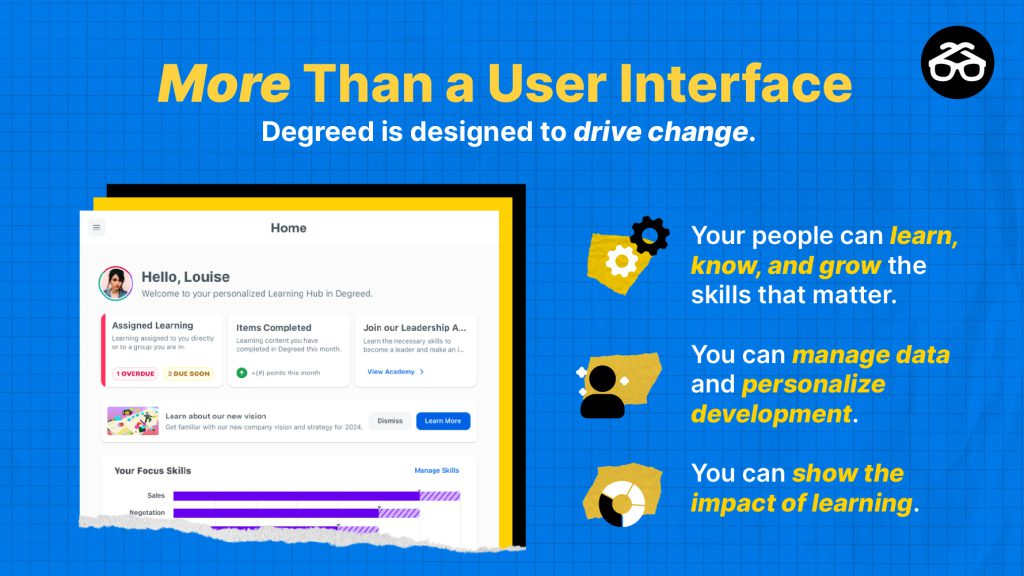
Degreed & the Talent Marketplace Together
Integrating a talent marketplace with Degreed can supercharge the learning experience.
Our LXP ingests, syncs, infers, and tracks skills—providing learning leaders with a clear picture of the capabilities an organization has and those it needs.
Talent marketplaces depend on the kind of data Degreed generates. That Degreed data is like rocket fuel. Without it, an organization runs the risk of:
- Employees sparingly using a talent marketplace, resulting in low organizational engagement.
- People having a non-cohesive experience.
- Workers not developing the skills they need to succeed in a new role, challenge, project, or task.
This is why some talent marketplaces offer learning resources from an LXP or partnerships with learning providers. These integrations support the ongoing development of an organization’s talent pool. Eightfold and Fuel50 integrate Degreed to achieve this very model.
Overall, organizations benefit from incorporating Degreed and a talent marketplace into their talent management strategies, enabling them to address a broader range of needs and maximize potential.
That ripple effect is massive. While Degreed grows the internal supply of skills through ongoing development, upskilling, and reskilling, a talent marketplace provides visibility into the demand for skills. Without Degreed preparing and filling the talent pipeline, demand goes unmet. Degreed helps maximize the potential of a talent marketplace.
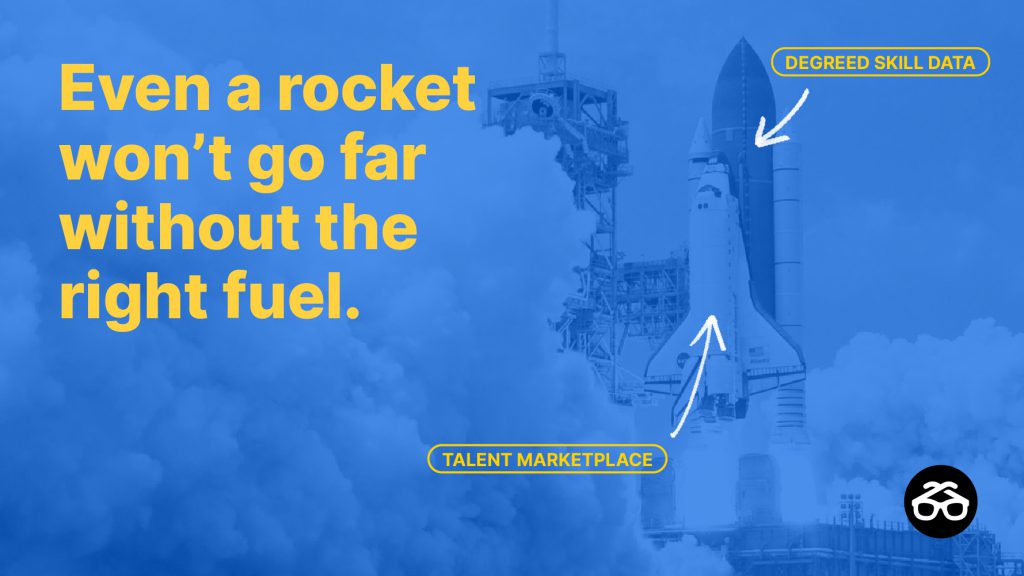
It’s important to note that both solutions will most likely have their own skill taxonomies, which will need to be de-duplicated (through the identification of synonyms and exact matches) to provide the best learning and talent management experience.
In Conclusion
The savviest leaders:
- Develop people with LXP
- Deploy people with a talent marketplace
An LXP empowers organizations to develop employees, improving employee productivity while identifying and growing the skills the business needs to execute strategic initiatives. It boosts employee engagement. And it aligns individual development with organizational goals.
On the other hand, a talent marketplace connects people with diverse skill sets to relevant work. And like an LXP, it offers scalability, cost savings, and flexibility. In doing so, it helps organizations to quickly and efficiently find and engage specialized expertise, supplement internal teams, and address short-term talent management needs.
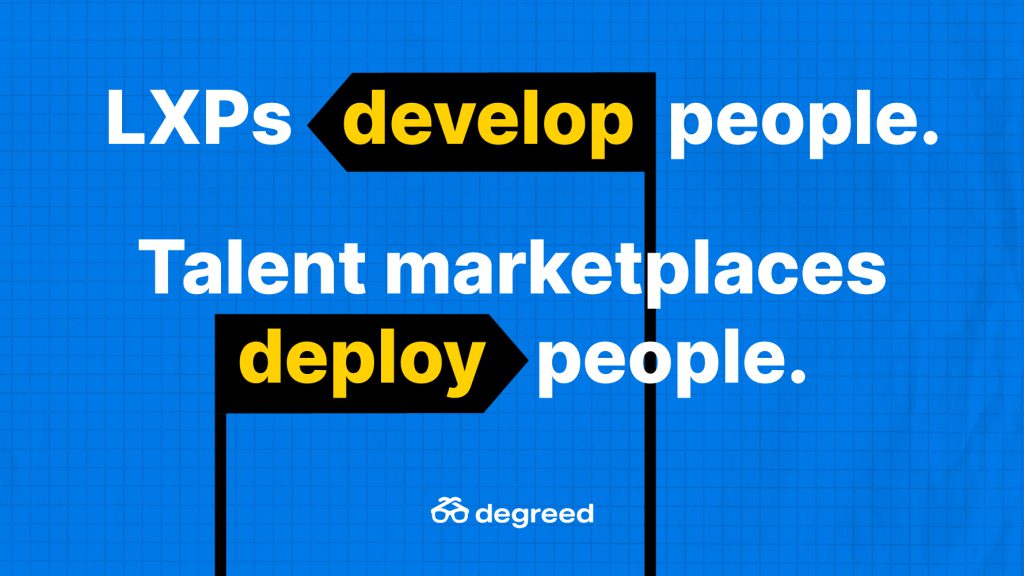
While there is some overlap, remember this: LXPs empower you to develop talent and grow skills while talent marketplaces facilitate talent sourcing and project-based collaboration.
Degreed and a talent marketplace work great together. In today’s dynamic business landscape, integrating an LXP and talent marketplace can help your organization to build a culture of continuous skill growth and learning, and to access the right talent at the right time.
Ready to find out more?
Check out our helpful guide to buying a learning experience platform:

